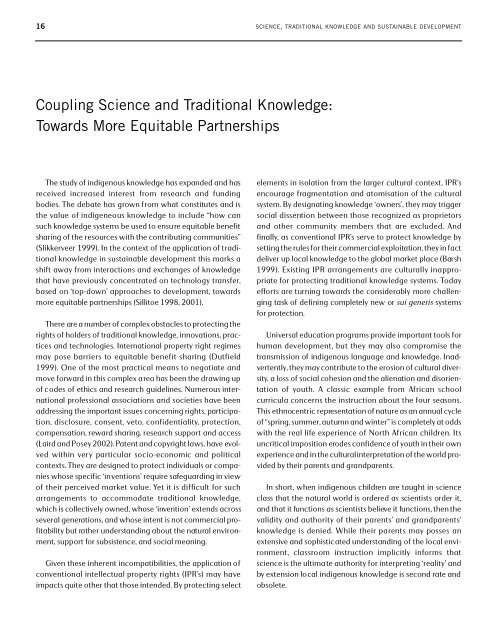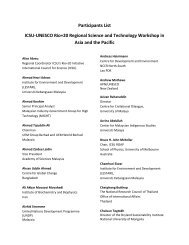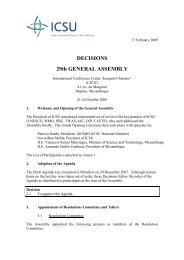Science, Traditional Knowledge and Sustainable Development
Science, Traditional Knowledge and Sustainable Development
Science, Traditional Knowledge and Sustainable Development
Create successful ePaper yourself
Turn your PDF publications into a flip-book with our unique Google optimized e-Paper software.
16<br />
Coupling <strong>Science</strong> <strong>and</strong> <strong>Traditional</strong> <strong>Knowledge</strong>:<br />
Towards More Equitable Partnerships<br />
The study of indigenous knowledge has exp<strong>and</strong>ed <strong>and</strong> has<br />
re ce ived incre ased inte rest from res e arch <strong>and</strong> fun d i n g<br />
bodies. The debate has grown from what constitutes <strong>and</strong> is<br />
the value of indigeneous knowledge to include “how can<br />
such knowledge systems be used to ensure equitable benefit<br />
sharing of the resources with the contributing communities”<br />
(Slikkerveer 1999). In the context of the application of traditional<br />
knowledge in sus tai n a ble development this mar ks a<br />
sh i ft away from inte ra c tions <strong>and</strong> exc h an g es of knowl e d g e<br />
th at have prev i o usly co n ce n trated on te c h n ol ogy tran s fe r,<br />
based on ‘to p - d own’ approa c h es to deve l o p m e n t, toward s<br />
more equitable partnerships (Sillitoe 1998, 2001).<br />
There are a number of complex obstacles to protecting the<br />
rights of holders of traditional knowledge, innovations, practi<br />
ces <strong>and</strong> te c h n ol og i es. Inte r n ational pro pe r ty right re g i m es<br />
m ay pose bar r i e rs to equi ta ble be n e fit sh aring (Dutfi e l d<br />
1999). One of the most pra c ti cal means to negoti ate an d<br />
move forward in this complex area has been the drawing up<br />
of codes of ethics <strong>and</strong> research guidelines. Numerous intern<br />
ational professional as s oc i ations <strong>and</strong> soc i e ti es have be e n<br />
addressing the important issues concerning rights, participation,<br />
disclosure, co n s e n t, ve to, co n fi d e n ti a l i ty, pro te c ti o n ,<br />
compensation, reward sharing, research support <strong>and</strong> access<br />
(Laird <strong>and</strong> Posey 2002). Patent <strong>and</strong> copyright laws, have evolved<br />
within ve ry par ti cu l ar soc i o - e conomic <strong>and</strong> pol i ti ca l<br />
contexts. They are designed to protect individuals or companies<br />
whose specific ‘inventions’ require safeguarding in view<br />
of their pe rce ived mar ket value. Yet it is diffi cult for such<br />
ar rangements to acco m m od ate tra d i tional knowl e d g e ,<br />
which is collectively owned, whose ‘invention’ extends across<br />
several generations, <strong>and</strong> whose intent is not commercial profitability<br />
but rather underst<strong>and</strong>ing about the natural environment,<br />
support for subsistence, <strong>and</strong> social meaning.<br />
Given these inherent incompatibilities, the application of<br />
co nve n tional inte l l e c tual pro pe r ty rights (IPR’s) may have<br />
impacts quite other that those intended. By protecting select<br />
S C I E N C E, T R A D I T I O N A L K N O W L E D G E A N D S U S TA I N A B L E D E V E L O P M E N T<br />
elements in isol ation from the larger cu l tural co n te x t, IPR’s<br />
e n co urage fra gm e n tation <strong>and</strong> ato m i s ation of the cu l tura l<br />
system. By designating knowledge ‘owners’, they may trigger<br />
s ocial dissention be tween those re cogn i zed as pro p r i e to rs<br />
<strong>and</strong> other co m m un i ty membe rs th at are excluded. And<br />
fi n a l l y, as co nve n tional IPR’s serve to pro tect knowledge by<br />
setting the rules for their commercial exploitation, they in fact<br />
deliver up local knowledge to the global market place (Barsh<br />
1999). Ex i s ting IPR ar rangements are cu l turally inapprop<br />
r i ate for pro te c ting tra d i tional knowledge sys tems. Tod ay<br />
e fforts are turning towards the co n s i d e ra bly more challenging<br />
task of defining co m pl e tely new or s ui generis sys te m s<br />
for protection.<br />
Universal education programs provide important tools for<br />
h um an deve l o p m e n t, but th ey may also co m p romise th e<br />
transmission of indigenous language <strong>and</strong> knowledge. Inadvertently,<br />
they may contribute to the erosion of cultural diversity,<br />
a loss of social cohesion <strong>and</strong> the alienation <strong>and</strong> disorientation<br />
of yo uth. A classic exam ple from Afr i can school<br />
cur r i cula co n cerns the instr u c tion abo ut the fo ur seas o n s .<br />
This ethnocentric representation of nature as an annual cycle<br />
of “spring, summer, autumn <strong>and</strong> winter” is completely at odds<br />
w i th the real life expe r i e n ce of No r th Afr i can children. Its<br />
uncritical imposition erodes confidence of youth in their own<br />
experience <strong>and</strong> in the cultural interpretation of the world provided<br />
by their parents <strong>and</strong> gr<strong>and</strong>parents.<br />
In sh o r t, when indigenous children are taught in science<br />
c l ass th at the natural world is ord e red as scientists order it,<br />
<strong>and</strong> that it functions as scientists believe it functions, then the<br />
va l i d i ty <strong>and</strong> auth o r i ty of their pare n t s’ <strong>and</strong> gran d pare n t s’<br />
k n owledge is denied. While their parents may po s s es an<br />
extensive <strong>and</strong> sophisticated underst<strong>and</strong>ing of the local enviro<br />
n m e n t, clas s room instr u c tion impl i c i tly informs th at<br />
science is the ultima te authority for interpreting ‘reality’ <strong>and</strong><br />
by extension local indigenous knowledge is second rate <strong>and</strong><br />
obsolete.




